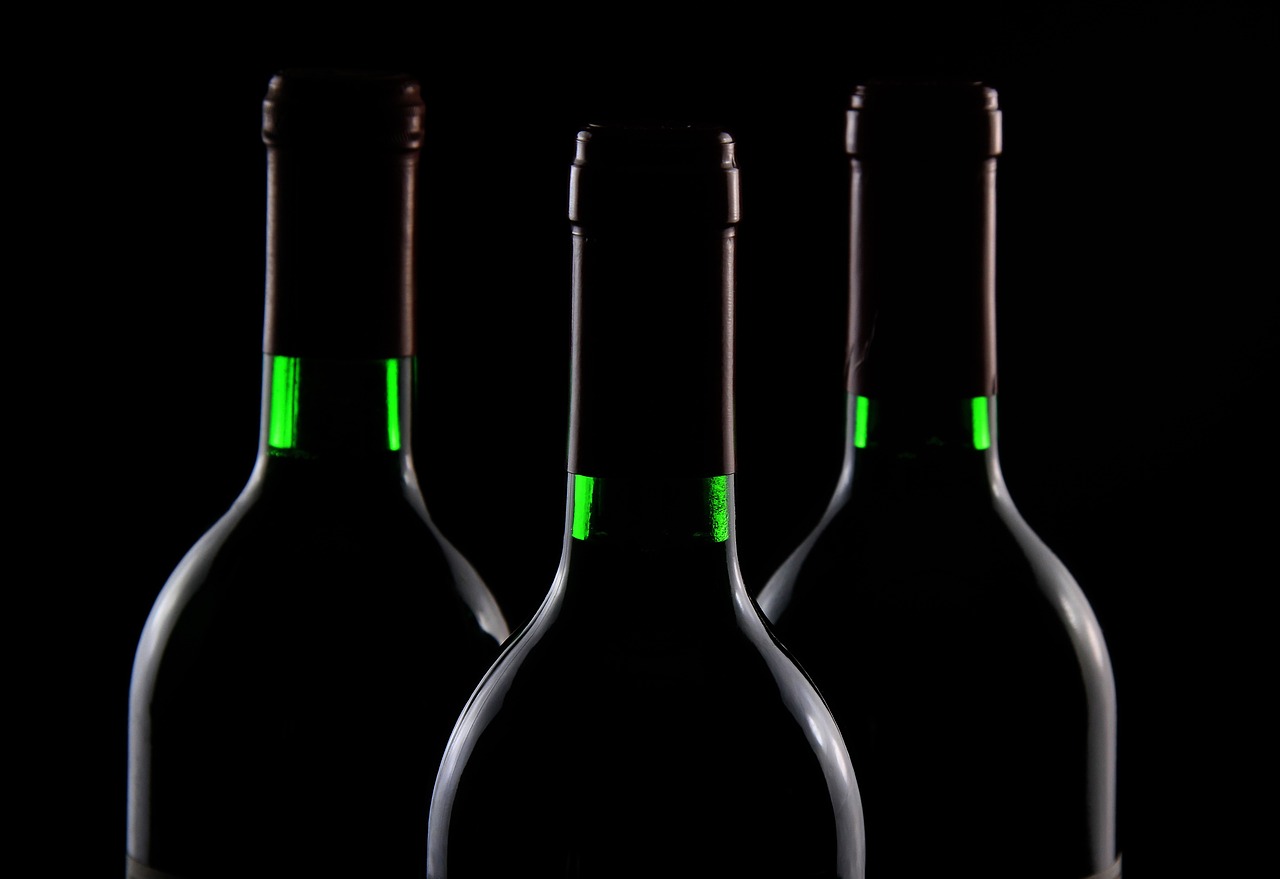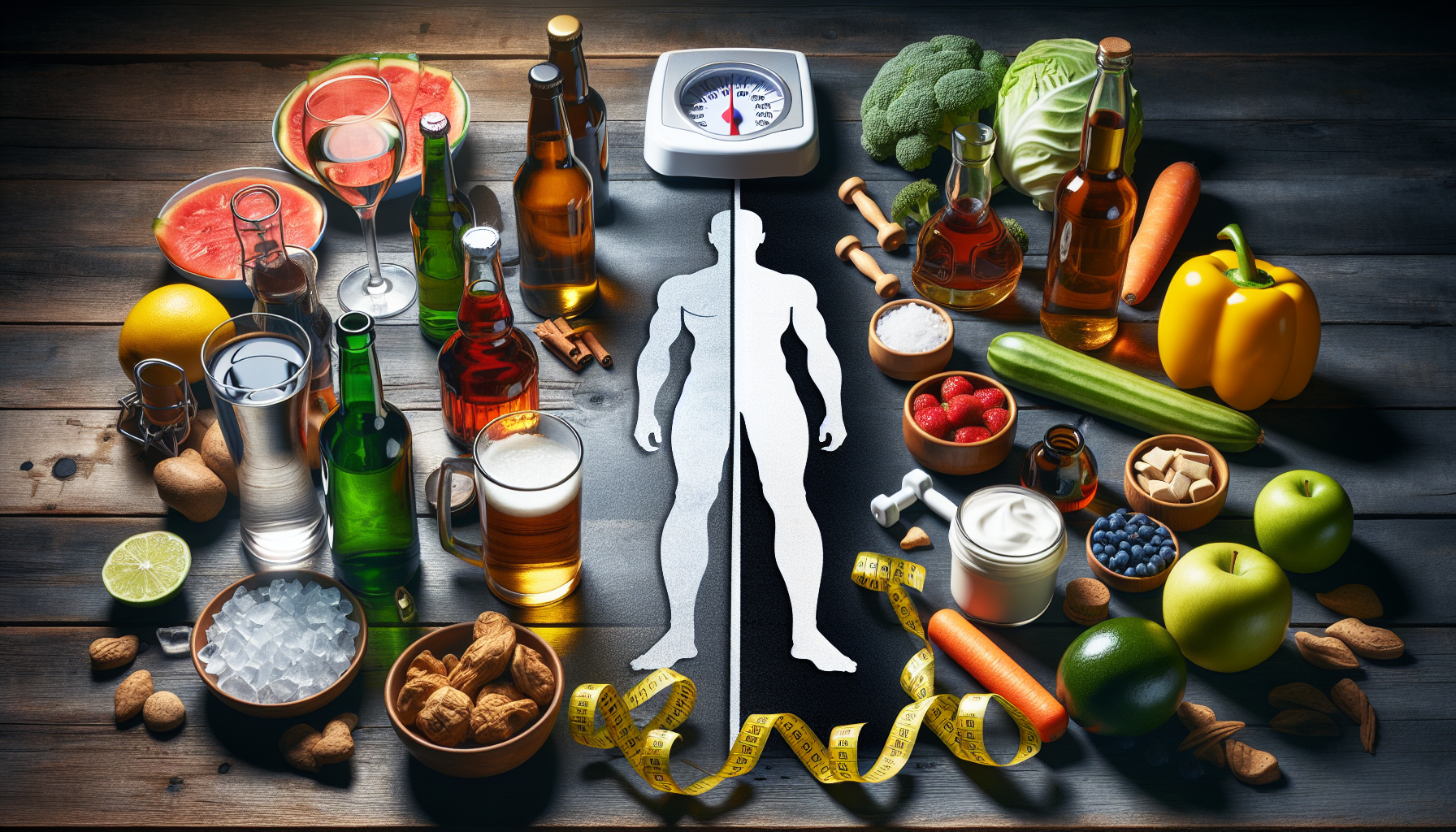Are you trying to shed those extra pounds and wondering how alcohol fits into your weight loss journey? Look no further. In this article, we will explore the impact of alcohol on weight loss and provide you with all the key insights you need to know. Discover how alcohol consumption can affect your metabolism, hinder fat burning, and even lead to weight gain. We’ll also share tips on how to make smarter choices when it comes to drinking alcohol while trying to lose weight. Remember, it’s always essential to consult a health professional before making any significant changes to your diet or exercise routine. So, grab a drink (water, for now), and let’s dive in!
Discover the Ultimate Weight Loss Secrets Here!
Understanding Alcohol and Weight Loss
How alcohol is metabolized in the body
Understanding how alcohol is metabolized in the body is essential when it comes to weight loss. When you consume alcohol, it enters your bloodstream and is quickly transported to your liver. In the liver, alcohol is metabolized primarily by enzymes called alcohol dehydrogenases. These enzymes break down the alcohol into acetaldehyde, a toxic substance that is further metabolized into acetic acid. Finally, the acetic acid is converted into carbon dioxide and water, which can be eliminated from the body.
The caloric content of alcohol
Alcohol contains calories, and these calories can have an impact on your weight loss journey. It’s important to note that alcohol is considered a macronutrient, just like carbohydrates, proteins, and fats. However, unlike the other macronutrients, alcohol provides empty calories, meaning it lacks essential nutrients such as vitamins, minerals, and fiber. Each gram of alcohol contains around 7 calories, which is more calorie-dense than carbohydrates and proteins but slightly less calorie-dense than fat.
Alcohol’s impact on metabolic rate
Alcohol can also affect your metabolic rate, which is the rate at which your body burns calories to maintain basic bodily functions. Research has shown that alcohol consumption can temporarily increase your metabolic rate, causing your body to burn more calories than usual. However, this increase is only temporary, and once the alcohol is metabolized, your metabolic rate returns to normal. It’s important to understand that any potential increase in metabolic rate due to alcohol is not significant enough to be considered a weight loss strategy.
Alcohol’s effect on nutrient absorption
Another factor to consider when it comes to alcohol and weight loss is its impact on nutrient absorption. Alcohol can affect the absorption and utilization of important nutrients like vitamins and minerals. Specifically, alcohol can interfere with the absorption of certain B vitamins, such as thiamin, folate, and vitamin B12, which are essential for energy production and overall health. Additionally, excessive alcohol consumption can damage the lining of the stomach and intestines, impairing nutrient absorption.
Alcohol’s Effects on Weight Loss Progress
Alcohol’s disruption of hormonal balance
Alcohol consumption can disrupt hormonal balance in the body, which can have implications for weight loss progress. One hormone that is particularly affected by alcohol is cortisol, also known as the stress hormone. Alcohol can elevate cortisol levels, which can lead to increased fat storage, particularly in the abdominal area. Moreover, alcohol can also disrupt the balance of other hormones, such as insulin and leptin, which play important roles in hunger regulation and fat metabolism.
The link between alcohol and increased appetite
Have you ever noticed that your appetite seems to increase after a few drinks? This isn’t just a coincidence. Alcohol has been shown to increase appetite in some people. It can stimulate the release of certain hormones, such as ghrelin, which is known as the hunger hormone. Elevated ghrelin levels can lead to increased feelings of hunger and cravings for high-calorie, unhealthy foods. This can make it more challenging to stick to a calorie-controlled diet and achieve your weight loss goals.
Alcohol’s impact on food choices
In addition to increasing appetite, alcohol can also influence your food choices. When you’re under the influence of alcohol, you may be more likely to reach for unhealthy, high-calorie foods, such as fried foods, snacks, and desserts. This can be attributed to the impact of alcohol on inhibitory control and decision-making processes in the brain. Alcohol impairs judgment and can weaken your ability to resist indulging in unhealthy food choices, ultimately hindering your weight loss progress.
Alcohol’s effect on sleep quality
Quality sleep is essential for weight loss and overall health. Unfortunately, alcohol can negatively impact your sleep quality. While alcohol can initially make you feel drowsy and help you fall asleep faster, it can disrupt your sleep patterns and lead to poorer overall sleep quality. Alcohol interferes with the normal sleep cycle, suppressing rapid eye movement (REM) sleep, which is crucial for cognitive function and restorative processes in the body. Impaired sleep can affect your energy levels, metabolism, and appetite regulation, making it more challenging to achieve your weight loss goals.

Click Here for Proven Fat-Burning Strategies!
Alcohol’s Influence on Fat Burning
The inhibition of fat oxidation
When it comes to burning fat, alcohol can interfere with the body’s ability to utilize fat stores for energy. When alcohol is present in the body, it becomes the primary fuel source that your body uses for energy. This means that your body prioritizes metabolizing alcohol over burning fat. As a result, the oxidation (burning) of fat is suppressed, leading to a decrease in fat burning and potentially hindering weight loss progress.
How alcohol affects the body’s ability to burn fat
Not only does alcohol inhibit fat oxidation, but it can also lead to increased fat storage. When alcohol is consumed, it is broken down into acetic acid, which is then converted to fatty acids in the liver. These fatty acids can be stored as fat in various parts of the body, particularly in the liver, leading to an increase in body fat. Furthermore, the high caloric content of alcohol can contribute to overall energy imbalance, further promoting weight gain.
Alcohol’s impact on muscle recovery and growth
If you’re engaging in strength training or other forms of exercise to support your weight loss journey, alcohol consumption can impede muscle recovery and growth. Alcohol has been shown to interfere with protein synthesis, which is the process by which your body builds and repairs muscle tissue. This can lead to impaired muscle recovery and hinder your progress in building lean muscle mass. Additionally, alcohol can dehydrate the body, which can negatively impact muscle function and performance during exercise.
The Role of Alcohol in Energy Balance
Alcohol’s contribution to overall caloric intake
Alcohol contributes calories to your overall caloric intake, and these calories should be taken into account when trying to achieve weight loss. It’s important to understand that alcohol calories are often considered “empty” calories because they provide little to no nutritional value. However, empty calories still contribute to your overall energy intake, and if not accounted for, can lead to a caloric surplus and weight gain. It’s crucial to include alcohol calories in your daily calorie budget to maintain energy balance and support weight loss.
The potential for alcohol to displace nutrient-dense foods
One of the challenges with alcohol consumption is that it can displace nutrient-dense foods in your diet. When you consume alcohol, you may be more inclined to choose alcoholic beverages and indulge in high-calorie snacks or meals, which often lack essential nutrients. This can result in an inadequate intake of important vitamins, minerals, and other micronutrients necessary for optimal health and weight loss. It’s important to prioritize nutrient-dense foods while considering your alcohol consumption to ensure you’re meeting your nutritional needs.
The role of alcohol in nutrient deficiencies
Excessive alcohol consumption can also lead to nutrient deficiencies. Alcohol can interfere with the absorption and utilization of important nutrients, as mentioned earlier. Specifically, alcohol can deplete essential B vitamins, including thiamin, folate, and vitamin B12. These vitamins play crucial roles in energy metabolism and overall health. Deficiencies in these vitamins can lead to fatigue, weakness, and impairments in cognitive function, among other negative health effects. It’s essential to be mindful of alcohol consumption to prevent nutrient deficiencies.
Unlock Your Path to a Healthier You!
Alcohol and Exercise Performance
The impact of alcohol on hydration levels
Proper hydration is essential for optimal exercise performance and overall health. However, alcohol has diuretic properties, meaning it increases urine production and can lead to dehydration. Dehydration can negatively impact your exercise performance by reducing endurance, strength, and overall exercise capacity. It’s important to prioritize adequate hydration and limit alcohol consumption before and during exercise to optimize performance and support your weight loss efforts.
Alcohol’s effect on muscle function and coordination
Alcohol can also impair muscle function and coordination, which can have detrimental effects on exercise performance. When you consume alcohol, it affects the central nervous system and inhibits proper muscle contraction and coordination. This can lead to decreased muscle strength, power, and balance, increasing the risk of injury during physical activity. It’s crucial to avoid alcohol consumption before engaging in exercise to ensure optimal muscle function and coordination.
How alcohol affects endurance and strength training
If endurance or strength training is a part of your weight loss plan, it’s important to consider the impact of alcohol on exercise performance. Alcohol can reduce endurance by decreasing the storage and utilization of muscle glycogen, the primary fuel source during endurance activities. This can lead to decreased stamina and a shorter time to fatigue during prolonged exercise. Similarly, alcohol can impair muscle protein synthesis, leading to decreased muscle growth and strength gains from resistance training. Limiting alcohol consumption can help optimize your exercise performance and support your weight loss goals.
Strategies for Managing Alcohol and Weight Loss Goals
Setting realistic alcohol consumption limits
When it comes to alcohol and weight loss, it’s important to set realistic limits for your alcohol consumption. This will vary depending on individual factors such as weight, metabolism, and goals, but the general recommendation is to consume alcohol in moderation. Moderation is defined as up to one drink per day for women and up to two drinks per day for men. It’s crucial to be mindful of your alcohol intake and monitor how it fits within your overall calorie and nutrient goals.
Choosing lower-calorie alcoholic beverages
If you’re looking to manage your weight while still enjoying the occasional alcoholic beverage, choose lower-calorie options. For example, opt for light beers, dry wines, or spirits mixed with calorie-free or low-calorie mixers like soda water. Be mindful of added sugars in alcoholic beverages, as these can contribute extra calories. By choosing lower-calorie options, you can reduce the overall caloric impact of alcohol on your weight loss journey.
Alternatives to alcohol for social gatherings
Social gatherings often involve alcohol, but it’s important to remember that there are alternatives to alcoholic beverages. Consider opting for non-alcoholic versions of your favorite drinks, such as mocktails or alcohol-free beer and wine. These options offer the flavor and enjoyment of alcoholic beverages without the added calories from alcohol. Additionally, hydrating with water or flavored sparkling water can help you stay hydrated and feel satisfied in social situations.
Planning for alcohol consumption in moderation
If you know you will be consuming alcohol on a particular occasion, plan for it in advance. Adjust your food choices and portion sizes throughout the day to accommodate the calories from alcohol. Focus on consuming nutrient-dense foods that provide essential vitamins, minerals, and fiber while keeping your overall calorie intake in check. By planning ahead, you can enjoy alcohol in moderation without completely derailing your weight loss progress.

The Importance of Moderation and Awareness
Recognizing individual tolerances and limits
When it comes to alcohol, individual tolerances and limits can vary. Some people may be more sensitive to the effects of alcohol, while others may have a higher tolerance. It’s important to recognize and respect your own limits when it comes to alcohol consumption. Pay attention to how alcohol affects your body, mood, and behavior. If you notice negative effects or difficulty managing your alcohol intake, it may be necessary to reevaluate your relationship with alcohol and seek support if needed.
Practicing mindful drinking habits
To support your weight loss goals, practice mindful drinking habits. This means being present and aware of your alcohol consumption, rather than mindlessly indulging. Pay attention to portion sizes and serving sizes of alcoholic beverages, as they can vary. Additionally, listen to your body’s signals of hunger and fullness, and be mindful of how alcohol may affect your appetite and food choices. By practicing mindfulness, you can make more conscious decisions about your alcohol consumption and its impact on your weight loss journey.
Understanding the cumulative effects of alcohol
It’s important to understand the cumulative effects of alcohol on your body and weight loss progress. While one or two drinks may not have a significant impact, consistent and excessive alcohol consumption can add up over time. The calories, disrupted hormonal balance, and potential nutrient deficiencies from alcohol can hinder your weight loss efforts. Be aware of how your overall alcohol intake fits into your broader health and wellness goals.
Being aware of potential triggers for excessive alcohol consumption
Excessive alcohol consumption can be driven by various triggers, including social situations, stress, or emotional factors. It’s important to be aware of these triggers and develop coping strategies to manage them without resorting to excessive alcohol consumption. Find healthier alternatives to cope with stress, such as exercise, meditation, or spending time with loved ones. If you consistently struggle with excessive alcohol consumption, it may be beneficial to seek professional help or support from counseling services or support groups.
Seeking Professional Guidance and Support
Consulting a registered dietitian or nutritionist
When it comes to managing alcohol and weight loss goals, consulting a registered dietitian or nutritionist can provide valuable guidance and support. These professionals can help you create a personalized approach to alcohol consumption that aligns with your weight loss goals and overall health. They can provide recommendations tailored to your individual needs and offer strategies for managing alcohol within a balanced diet.
Working with a personal trainer or exercise specialist
If exercise is a significant component of your weight loss journey, consider working with a personal trainer or exercise specialist. They can provide guidance on how to optimize your exercise performance while taking into account the potential impact of alcohol. They can help tailor your exercise routine to support your weight loss goals and develop strategies for fitting exercise into your lifestyle.
Seeking help from support groups or counseling services
Excessive alcohol consumption can sometimes be influenced by underlying emotional or psychological factors. If you find it challenging to manage your relationship with alcohol, seeking help from support groups or counseling services can be beneficial. These resources can provide a safe space for you to explore your feelings and develop healthy coping mechanisms. Remember that reaching out for support is a sign of strength and can greatly contribute to your overall well-being.
Understanding the individualized nature of weight loss journeys
Finally, it’s important to understand that weight loss journeys are highly individualized. What works for one person may not work for another when it comes to managing alcohol and weight loss goals. It’s crucial to find an approach that aligns with your unique needs, preferences, and lifestyle. Seeking professional guidance can help you navigate this process and develop a plan that sets you up for success.

Conclusion: Balancing Alcohol and Weight Loss
In conclusion, achieving and maintaining weight loss requires a holistic approach that takes into account the impact of alcohol on your body and overall health. Alcohol can disrupt hormonal balance, increase appetite, and affect food choices, all of which can hinder weight loss progress. It can also interfere with fat burning, muscle recovery, and nutrient absorption, further complicating your weight loss journey. However, by setting realistic limits, choosing lower-calorie options, and planning for alcohol consumption in moderation, you can strike a balance between enjoying the occasional drink and still achieving your weight loss goals.
Remember, everyone’s relationship with alcohol is unique, and it’s essential to recognize and respect your individual limits. Practicing mindful drinking habits, understanding the cumulative effects of alcohol, and being aware of potential triggers for excessive consumption are crucial steps in managing your alcohol intake. Seeking professional guidance and support from registered dietitians, nutritionists, personal trainers, or counseling services can provide valuable assistance as you navigate the complexities of alcohol and weight loss.
Always remember to consult a health professional before making any changes to your diet or exercise routine. They can provide personalized advice based on your specific circumstances and help you develop a plan that supports your overall health and weight loss goals. Your journey to weight loss is unique, and with the right approach, you can find a balance that works for you.

